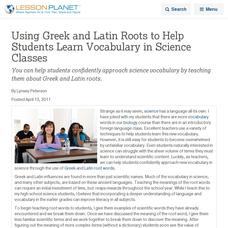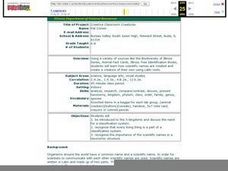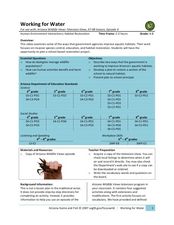Curated OER
Using Greek and Latin Roots to Help Students Learn Vocabulary in Science Classes
You can help students confidently approach science vocabulary by teaching them about Greek and Latin roots.
Curated OER
Scientific Root Words, Prefixes, and Suffixes
It's hard to imagine that anything was missed on this five-page list of science roots, prefixes, and suffixes! Listed in alphabetical order, all are included in a single, two-column list. This may be especially useful for advanced...
Curated OER
Guided Reading Organizer for Chain Reaction
The class uses Chain Reaction, a magazine, to build a better understanding of Latin and Greek roots found in scientific vocabulary. They use two attached worksheets to help them read a scientific article, using visual clues and their...
Curated OER
Creative Classroom Creatures
Students are introduced to the five kingdoms and discover why there is a need for a classification system. Using the internet, they examine how scientific names are created and practice putting animals into their correct classification....
Curated OER
Life Science: Living Things
Have your class build their vocabulary bank by studying life science terms. Basic terms like organism, cell, unicellular, and vertebrate are included on the definition sheet provided. Demonstrate how to identify different life science...
Curated OER
The Language of Science
For this language of science worksheet, students use the list provided to guess the meaning of each of the list. Students apply root words, prefixes, and suffixes to gain meaning of other science words.
Alabama Learning Exchange
Animal Classification
Present information about the classification of animals. After participating in the teacher-led discussion about scientific names, small groups devise their own way of classifying everyday objects present in the classroom, developing...
Alabama Learning Exchange
The Rockin' Rock Cycle: Metamorphic Rocks
Students study the formation of metamorphic rock. In this metamorphic rock lesson, students examine how metamorphic rock forms as part of the rock cycle. They review the rock cycle using chocolate chips, conduct Internet research, and...
Alabama Learning Exchange
The Causes of Pollution
Learners identify types of pollution. In this environmental lesson, students view a video and discuss the types of pollution. Learners create a poster to suggest ways to prevent pollution.
Curated OER
Life's Lessons: Survival of the Fittest
Students analyze Jack London's use of anthropomorphism to identify the importance of adaptability in life. In this literature lesson, students use the novel The Call of the Wild to identify key elements in survival. Students...
Alabama Learning Exchange
Echolocation Stations: Exploring Sound
Fourth graders explore the concept of echolocation during a unit on whales. They listen to the book and watch the Reading Rainbow video for "Humphrey: The Wayward Whale," explore various websites, and conduct experiments to demonstrate...
Curated OER
After the Garbage Can: Where Does Our Trash Go?
Students explore how waste disposal has changed over time and what the current issues are. In this disposal instructional activity students collect data and create graphs.
Curated OER
Centipede or Millipede?
Students discuss millipedes and centipedes in terms of their classification as arthropod. Using a diagram, students categorize and compare and contrast the characteristics of millipedes and centipedes based on their discussion of...
Curated OER
Working for Water
Students examine the ways that government works to help improve aquatic habitats. In this water habitats lesson students view a video and plan a school restoration project.










